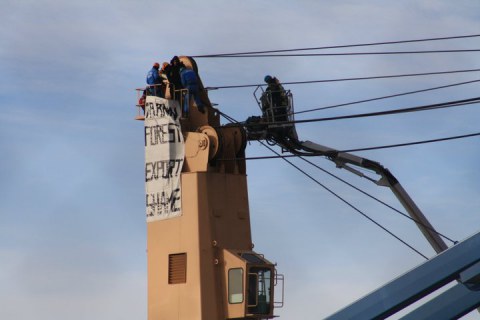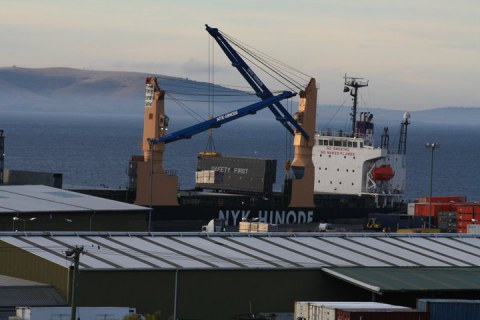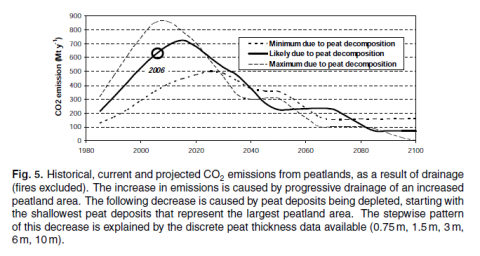Conservationists have today participated in a protest on Hobart's wharf, where a vessel is being loaded for the Malaysian logging company Ta Ann. The protest highlights the ongoing loss of high conservation value temperate forests in Tasmania and the rapacious logging of tropical rainforests of Borneo and destructon of habitat for Orangutan and dispossession of the indigenous Penan people from their ancestral forests and lands.
"Four conservationists have attached themselves to the vessel, we are participating in today's non violent protest to highlight the ongoing loss of high conservation value forests," Huon Valley Environment Centre's Jenny Weber said.
Youtube video | Photos of the action
"Ta Ann's long term demand for native forest, and the Tasmanian government's commitment to their contract till at least 2027, locks in Tasmania to losing valuable wildlife habitat and vital carbon stores for decades," Jenny Weber said.
"These five peaceful protestors were strip searched by the police, in an unnecessary and inappropriate treatment of people participating in a non violent direct action,' Huon Valley Environment Centre's Jenny Weber said. Three conservationists were earlier escorted from the premises, they will be charged with trespass by summons.
Ta Ann is a timber company located in Sarawak, Malaysia with interests in timber concession and harvesting, sawmilling, plantation aforestation, oil palm plantations and milling of palm oil. It is now one of Malaysia's largest logging companies with close connections to the Chief Minister of Sarawak Taib Mahmud. According to the Sarawak report Ta Ann is run by the multi-billionaire Hamid Sepawi, the cousin and business proxy of Taib himself, who has been listed personally as one of Malaysia's richest men.
"We are witnessing the shameful export of native forests, when high conservation value forests should be in a moratorium now and a swift transition out of native forests is crucial," Jenny Weber said. "There is a crisis in the logging industry, and a failure of the Federal and State Government to provide real and lasting solutions, meanwhile it's business as usual in the forests. Huon Valley Environment Centre will continue to stand up to highlight the ongoing logging of native forests and endangered species habitat,"
Five conservationists were arrested at 10am this morning after they locked on to a tower attached to the crane that loads veneer. Four of those activists have been released and are due to appear in court 22 August. One of the activists who locked on, has been remanded in custody to appear tonight in court at 7pm.
"In Tasmania, the forests of Esperance, Bruny Island, the Weld Valley, Arve and Picton Valleys are all falling to feed this multi-national logging giant's appetite for trees. Our forests are continuing to make these billionaire logging barons richer while our state loses its wildlife and forests. Ta Ann claims it is getting these forests cheaper than in Sarawak, where it benefits from being part of the Borneo timber mafia. Its 20 year contracts for wood supply and demand for High Conservation Value forests jeopardise a moratorium on logging and the opportunity for a short term transition out of native forests," said Adam Burling, a spokesperson for the Huon Valley Environment Centre in a March 2011 media release.
Supporting orangutan habitat and tribal rights of indigenous Penan people
According to the Huon Valley Environment Centre Ta Ann has profited from the logging of orangutan habitat and the displacement of indigenous people. "This protest is in solidarity with the people in Sarawak whose lives have been displaced by Ta Ann's logging practices," said Jenny Weber regarding today's protest on a Hobart wharf.
An account in the Sarawak Report on May 20, 2011 describes the activities of loggers in Sarawak:
"Indeed, as Sarawakians all know, threats and intimidation have been the established method by which the loggers, licenced by Taib, have dealt with complaints by local forest people and those communities who have Native Customary Rights to the land they have taken. Fear of the Thugs and Gangsters hired by loggers pervades the whole state."
"We have covered a number of recent incidences showing how these gangs have been used by logging companies to come in and do their dirty work, attacking villagers with clubs, knives, explosives and guns. Complaints are routinely ignored by the police, who know that this behaviour is tacitly sanctioned by Taib Mahmud. The Chief Minister, who is also Finance Minister, Resources and Planning Minister and Head of the Sarawak Timber Industry Development Corporation, has taken a vast personal cut from the profits from logging in the State over the last 30 years and more."
"Ta Ann is part of the Taib family's global network of corruption and environmental destruction. The company is controlled by the Sarawak Chief Minister's cousin and a key crony. We have seen Ta Ann destroying the tropical rainforests of Sarawak. Now they are doing the same to the Tasmanian forests," said Lukas Straumann, Bruno Manser Fund (Switzerland based NGO)
A February 2011 report for the Swiss NGO Bruno Manser Fund on the Sarawak timber industry said: "Sarawak has experienced one of the most rapid log clearances in the whole Southeast Asian region. In the late 1970s, some 76 percent of Sarawak was under forest cover, and 90 percent of it was under logging concessions. It is estimated that, between 1963 and 1986, over 30 percent of the total forest area was logged."
According to Survival International the Sarawak state government of Taib Mahmud does not recognize the rights of the Penan indigenous people to their land. Since the 1970s, it has backed large-scale commercial logging on tribal land across Sarawak, but not without blockades and resistance from the Penan from 1987 to 1993 which were subdued by riot police.
Penan continue to be displaced from their ancestral forests and lands to make way for palm oil plantations and a series of twelve new hydroelectric dams that will flood Penan and other indigenous villages. Survival's Director, Stephen Corry, said in a June 2011 media release, "Even by the appalling standards of the Sarawak government, which has treated the Penan with contempt for decades, this is breathtakingly cynical. Not only is it forcing more than 1,000 people from the forests they have lived in for generations, it has sold off the area it promised them as a new home, and is allowing it to be cleared for plantations. It looks like the government won't be satisfied until the Penan are reduced to utter poverty and destitution."
Construction of the Murum Dam has started and is due to come on stream next year. The twelve dams are called the 'Sarawak corridor of renewable energy' (SCORE), which will involve oil, timber, aluminium and palm oil enterprises lining the pockets of elite famillies while continuing to threaten and dispossess the land of Sarawak's tribal people.
The Bruno Manser Fund has an ongoing campaign to Stop Timber Corruption and freeze Taib assets.
Deforestation in Sarawak and Climate Change
A report by Wetlands International in February reported on the Borneo Orangutan Survival website reports "Two thirds of Sarawak's peatlands were until recently covered by thick, biodiversity-rich rainforest. Between 2005-2010 almost 353,000 hectare of the one million hectare peatswamp forests were opened up at high speed; largely for palm oil production. In just 5 years time, almost 10% of all Sarawak's forests and 33% of the peatswamp forests have been cleared. Of this, 65% was for conversion to palm oil production. (2011; Sarvision, Impact of oil palm plantations on peatland conversion in Sarawak 2005-2010.) Marcel Silvius from Wetlands International said: "As the timber resource has been depleted the timber companies are now engaging in the oil palm business, completing the annihilation of Sarawak's peat swamp forests."
Tropical deforestation is a major source of carbon emissions to the atmosphere. The Wetlands International report says:
Malaysia used to have about 2.5 million ha of peatland forests. Conversion and drainage of these natural carbon stores causes a rapid decomposition and subsidence of the organic soil leading to huge carbon dioxide emissions, lasting for decades. Very cautious and conservative estimates put greenhouse gas emissions from palm oil plantations on peat at 40 tonnes of CO2 per hectare per year. Using this very conservative estimation, the 510,000 ha of peatlands in Malaysia drained for palm oil production thus cause the release of some 20 million tonnes/CO2 annually. However, twice this amount is more likely.
South East Asian forests store at least 42 000 Million metric tonnes (Mt) of soil carbon. According to a scientific paper published July 2009 - Current and future CO2 emissions from drained peatlands in Southeast Asia - of the 27.1Million hectares (Mha) of peatland in Southeast Asia, 12.9 Mha had been deforested and mostly drained by 2006. The extent of carbon emissions released by destruction of these peatlands "makes conservation of remaining forested tropical peatlands, and rehabilitation of degraded ones, a significant opportunity for carbon emission reductions. The concentrated nature of these emissions, they are produced on less than 0.1% of the global land area, makes them potentially easier to manage than many other emissions caused by multiple types of land conversion. Improved water management planning for whole hydrological units (peat domes) is the basis for conservation of peat resources."
The report concludes "A post-Kyoto treaty after 2012 which includes carbon credits from Reduced Emissions from Deforestation and Degradation (REDD) is one of the most important opportunities for tropical peatlands to be valued for their environmental importance. This development will largely determine the opportunities for improved management, rehabilitation and conservation, and consequently the magnitude of ghg emissions in the future."

The deforestation and logging of tropical rainforests will increase CO2 emissions and reduce the substantial carbon sink provided by the forests. New scientific research has found that Forests play a major role as carbon sinks, particularly in the tropics.
Sources:
- Huon Environment Centre media release July 17, 2011 - Ta Ann Vessel Protest in Tasmania
- Huon Environment Centre media release July 17, 2011 - Conservationists arrested on Tasmanian logging vessel
- Huon Environment Centre media release March 25, 2011 - Ta Ann linked to corruption in Sarawak
- Sarawak Report, May 20, 2011 - Taib shows true colours in Tasmania
- Survival International media release June 15, 2011 - Penan hunter-gatherers to be dumped in vast oil palm plantation
- Bruno Manser Fund in Switzerland, February 2011 - Development of Global Timber Tycoons in Sarawak, East Malaysia - History and Company Profiles (PDF)
- Borneo Orangutan Survival reporting Wetlands International: 1 February 2011 - New figures: palm oil destroying Malaysia's peatswamp forests faster than ever
- Photos from Huon Valley Environment Centre Facebook Album - 20110717 ta Ann ship action
- Image from A. Hooijer, S. Page, J. G. Canadell, M. Silvius, J. Kwadijk, H. W¨ osten, and
J. Jauhiainen, Biogeosciences Discuss., 6, 7207-7230, 2009. Published 20 July 2009 - Current and future CO2 emissions from drained peatlands in Southeast Asia and used under the Creative Commons Attribution 3.0 License.




Comments
Re: Conservationists arrested protesting logging in Tasmania ...
Hurray, we support your action to protect your forest for your children. Finally it is a wake up call for the greedy. Just look at Sarawak forest. It was destroyed by greed. What happen to Sarawak forest can also happen to Tasmania forest. Stand up and fight for protection of your forest. We have fought to protect our forest but nobody listen. We have one Bruno Manser who has gave his life and fought along us for Sarawak rainforest preservation and the protection of indigenous peoples,but he has gone "missing".
Re: Conservationists arrested protesting logging in Tasmania ...
George Soros: “Look at the Sarawak Chief Minister selling billions worth of timber concessions under the table; selling every piece of state land to businessmen without tender; using his own companies to obtain lucrative government contracts; … 'you pay I approve'. He has 8 billion US stashed overseas….. In China people have been shot for embezzling one thousand dollars. With 8 billion you have stolen, therefore you would be shot 80,000 times. Now you are leading an anti-corruption campaign. We all know what you should do. Look yourself in the mirror.”
“The Prime Minister built highways without tender, your cronies get the deal and the price double. Your Langkawi airport runway was built double the cost by your…….Ekran.”
Re: Conservationists arrested protesting logging in Tasmania ...
Taib & all his cronies & supporters, they should never be forgotten & left scot-free. Many of them deserve nothing less than confiscation of their ill-gotten gains and imprisonment or long-term exile.
The tragedies caused by crime & corrupton in the highest levels are far reaching! Poverty, hardship, more crime. Social strife, anti-social behaviour, selfish culture, lack of facilities & amenities, poor education and health care, pitiful roads and infrastructure, traffic jams, flooding, deaths. It is incredible Sarawakians are that gullible and can forgive multi-billion corruption to the tune of RM28billion (George Soros’ estimated at US$8billion = RM28,000million). Think of the losses suffered by you! The Leader or leaders should have been arrested 30 yrs ago. Are we tolerating this another day?